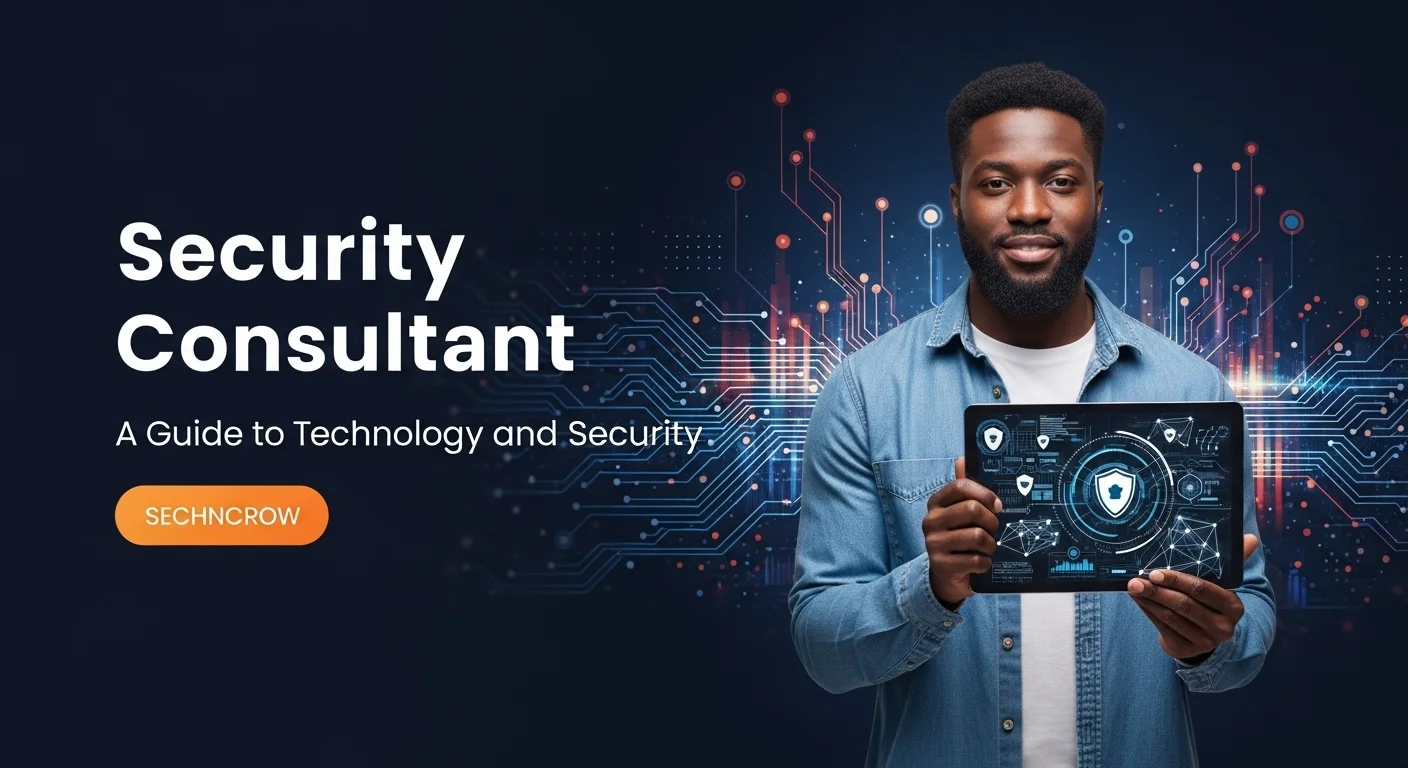What Does a Security Consultant Actually Do? A Real-World Guide

Executive Summary
In a world that runs on data, the role of a Security Consultant has gone from a 'nice-to-have' to an absolute necessity. I've spent years in this field, and I've seen firsthand how cyber threats can bring a business to its knees. This isn't just about hackers in hoodies; it's about protecting your company's reputation, finances, and future. In this guide, I'll pull back the curtain on what a security consultant really does. We'll walk through everything from assessing risks and building digital fortresses to the key differences between IT, information, and network security. You'll understand when to hire an independent expert versus a larger firm and why this role is your first, best step toward building a truly resilient business. This is the practical, no-nonsense knowledge you need to protect your most valuable assets.
Table of Contents
Table of Contents
- What is a Security Consultant and Why Are They So Important?
- The Core of Security Consulting in Modern Technology
- Differentiating Key Areas: IT, Information, and Network Security
- The Business Case for Hiring Security Consultants
What is a Security Consultant and why is it important in Technology?
Let's be honest, 'digital transformation' is a term that gets thrown around a lot. But behind the buzzword is a simple truth: every business today is a tech business. And with that reliance on technology comes risk. It's a constant battle against data breaches, ransomware, and other threats that seem to get smarter every day. The potential damage, both financial and to your reputation, can be devastating. This is where someone like me, a Security Consultant, comes in. Think of us as the strategic advisors who protect your company's digital lifeblood. Our job is to bridge the gap between your business goals and the technical shields needed to achieve them safely, making sure your defenses are not just strong, but smart and aligned with your specific needs.
The Core of Security Consulting in Modern Technology
At its heart, my job is all about managing risk. I've always said that a good security consultant is a professional worrier—we think about all the things that could go wrong so our clients don't have to. The process starts with a deep dive to identify, assess, and then mitigate security risks. We look at everything, from the locks on the server room door to the tiniest details of your digital infrastructure. We perform thorough assessments to find the weak spots in your systems, apps, and daily processes. This can involve vulnerability scans, simulated attacks known as penetration tests, and detailed security audits. The goal is to get a crystal-clear picture of your security posture: What are your most valuable assets? What threats are you most likely to face? And how well are your current defenses holding up? Based on that analysis, we build a strategic roadmap for improvement. This isn't just about pointing out problems; it’s about providing practical, tailored solutions that make your entire company more resilient.
Differentiating Key Areas: IT, Information, and Network Security
The field of security consulting is vast, and most of us specialize. Understanding these specialties helps you find the right person for the job.
Information security consulting is the big-picture view. It’s about protecting all of your valuable information, whether it's on a hard drive, a piece of paper, or in someone's head. As an information security consultant, I focus on what we call the 'CIA' triad: Confidentiality (keeping secrets safe), Integrity (making sure data is accurate), and Availability (ensuring you can get to your data when you need it). We help build governance, risk, and compliance (GRC) programs to meet standards like ISO 27001 or GDPR, weaving security into the company's culture.
IT security consulting zooms in on the technology itself. These consultants are the hands-on experts for the hardware and software that run your business. They secure your servers, databases, and applications. I've spent countless hours configuring firewalls, setting up intrusion detection systems, and managing encryption. When you need to lock down your computer systems and the data flowing through them, you call an IT security consultant. Many cybersecurity firms specialize here, offering a level of technical depth that's tough to build in-house.
Network security consultants are the guardians of your digital highways. In our connected world, the network is how everything communicates, making it a prime target for attackers. These specialists design and build secure network architectures. Their work includes configuring routers, setting up secure remote access (VPNs), and stopping intruders at the digital gate. They analyze network traffic for anything suspicious and are often the first line of defense against attacks that aim to knock your services offline. With today's mix of office, cloud, and remote work environments, their expertise is more critical than ever.
The Business Case for Engaging Security Consultants
For most businesses, bringing in a consultant is a smart, strategic move. One of the biggest wins is immediate access to specialized expertise. The cyber world changes in the blink of an eye, with new threats and technologies popping up constantly. It's incredibly expensive and difficult for a company to have an in-house expert for everything. Reputable security firms invest heavily in training their people, so you can tap into top-tier knowledge exactly when you need it, without the overhead of another full-time salary.
It's also surprisingly cost-effective. The cost of a consultant might seem high upfront, but it pales in comparison to the cost of a data breach, which can easily run into the millions. By proactively fixing vulnerabilities, a consultant helps you prevent those catastrophic events. Often, outsourcing security tasks is cheaper than building and training your own team.
Compliance is another huge value-add. Regulations like HIPAA, PCI DSS, and GDPR are a complex maze, and a misstep can lead to hefty fines. We are experts in these frameworks. We can guide you through audits, help you achieve certification, and keep you compliant. This not only saves you from penalties but also builds trust with your customers.
Finally, we bring an objective, third-party perspective. Your internal team can sometimes be too close to the action, developing blind spots. A consultant comes in with fresh eyes, free from company politics, to give you an honest assessment. That unbiased view is invaluable for driving real, lasting security improvements and fostering a culture where security is everyone's responsibility.

Complete guide to Security Consultant in Technology and Business Solutions
A Security Consultant acts as a vital translator, turning complex technical jargon into smart business strategy. This allows organizations to safely navigate the digital world. This guide explores the hands-on methods, strategic thinking, and essential tools that define modern security consulting. Whether you're a business looking to hire or a professional aspiring to become a consultant, understanding these elements is key. I've learned that this job is a dynamic dance between deep technical skill and sharp business sense, where success is measured by my client's peace of mind.
Technical Methods and Frameworks in Security Consulting
At the core of our work are proven technical methods used to test and strengthen a company's defenses. These aren't abstract theories; they are practical techniques that uncover real-world vulnerabilities.
Vulnerability Assessment and Penetration Testing (VAPT): This is one of our most requested services. Think of a vulnerability assessment as a systematic check-up, using automated tools to scan for known weaknesses like outdated software. The result is a prioritized list of what to fix first. A penetration test, or 'pen test,' is where we take it a step further. I put on my 'ethical hacker' hat and actively try to break in, just like a real attacker would. This demonstrates the actual risk and makes the case for fixing a vulnerability undeniable. We use a whole arsenal of tools like Metasploit and Burp Suite to do this, showing companies exactly how a breach could happen.
Security Audits and Architecture Reviews: While a pen test is offensive, an audit is a meticulous defensive review. We go line-by-line through configurations, access rights, and even code to ensure everything aligns with security best practices. An architecture review is a higher-level look at how all your security controls fit together. I analyze diagrams and data flows to find design flaws that could create a major breach down the road. It’s about building security in from the start, not just patching holes later.
Threat Modeling: This is where we try to get inside an attacker's head. Using frameworks like STRIDE, we systematically brainstorm potential threats to a system before it's even built. By thinking through how someone might try to spoof identities, tamper with data, or deny service, we can identify design-level security issues that are easily missed. It's a crucial step in developing secure software.
Incident Response and Digital Forensics: When the worst happens and a breach occurs, every second counts. Many security firms offer incident response (IR) services to help companies contain the damage, kick out the intruder, and recover. A huge part of this is having a solid Incident Response Plan ready to go. We help create these plans and run drills to make sure everyone knows their role. After an incident, digital forensics specialists come in to piece together what happened. They collect and analyze digital evidence from computers and networks to understand the full scope of the breach and support any legal action.
Business Techniques and Strategic Alignment
A great consultant knows that technology is just a tool to achieve business goals securely. We have to be as comfortable in the boardroom as we are in the server room.
Governance, Risk, and Compliance (GRC): This is the strategic glue that holds a security program together. We help businesses build a GRC framework to manage security in a structured way. A key part is risk assessment, where we identify not just technical risks, but business risks, like the financial fallout from failing to comply with a regulation. We guide organizations in adopting proven frameworks like the NIST Cybersecurity Framework and ISO 27001. NIST offers a flexible, risk-based approach, while ISO 27001 is a more formal standard that is great for companies seeking official certification.
Security Policy Development: Clear security policies are the bedrock of a strong defense. We work with leaders across a company to write policies that are both strong and practical. These documents cover everything from how to create a good password to how to handle sensitive data. A good set of policies gives employees clear rules and shows auditors that you're taking security seriously.
Security Awareness Training: At the end of the day, people are often the weakest link. Phishing attacks, for example, work by tricking people, not computers. I help organizations build training programs to teach employees about these threats and how they can be the first line of defense. This might involve online courses, fake phishing emails to test their awareness, and workshops. Creating a security-savvy culture is one of the most effective ways to reduce risk.
Resources and the Ecosystem of Security Consulting
The world of security consulting is supported by a rich ecosystem of resources, certifications, and different types of firms.
Professional Certifications: For any consultant, certifications are proof of our expertise. Some of the most respected ones include:
- CISSP (Certified Information Systems Security Professional): A broad, management-focused certification.
- CISM (Certified Information Security Manager): Focuses on security governance and risk management.
- CEH (Certified Ethical Hacker): A hands-on cert for pen testers.
- CompTIA Security+: A fantastic starting point that covers the fundamentals.
In-House vs. Consulting Companies: A big decision for any business is whether to build its own security team or hire a cybersecurity firm. An in-house team knows your business inside and out. However, they can be expensive and it's hard to cover all skill sets. Hiring a cybersecurity firm gives you access to a wide range of specialists, an objective viewpoint, and the ability to scale up or down as needed. I've found that a hybrid model often works best: an in-house team handles the day-to-day, and they partner with consultants for specialized projects like audits or incident response. These firms bring a wealth of experience from different industries, offering solutions an internal team might never have thought of.
Ultimately, a Security Consultant is a trusted advisor. By blending deep technical knowledge with a strategic business mindset, we empower companies to not just protect themselves, but to innovate and grow with confidence.

Tips and strategies for Security Consultant to improve your Technology experience
Whether you're a business looking to hire a security consultant or a professional building a career in this field, the right approach makes all the difference. For businesses, it's about building a partnership based on trust and clear goals. For consultants like me, success comes from a relentless commitment to learning and mastering both the technical and human sides of the job. Here are some practical tips and best practices to get the most out of the experience.
Best Practices for Businesses Hiring a Security Consultant
Bringing in a consultant is a big investment. Following these practices will help ensure you get a great return on it.
1. Clearly Define Your Scope and Objectives: Before you even start your search, know exactly what you want to accomplish. Are you trying to meet a regulation like PCI DSS? Do you need a deep-dive risk assessment of your cloud setup? Or are you dealing with a security breach right now? Writing down a clear scope of work helps you find a consultant with the right skills and gives you a clear way to measure success. A vague request to 'make us more secure' will only lead to frustration.
2. Vet Credentials and Experience Thoroughly: Not all consultants are created equal. When you're evaluating candidates, look past the sales pitch. Check for respected industry certifications like CISSP or CISM. Ask for case studies and references, especially from companies in your industry. I always tell potential clients: don't just look at my certifications, ask me to tell you a story about a time I solved a problem like yours. A seasoned consultant should be able to share concrete examples of their work. Don't be shy about asking tough questions about their methods and how they stay up-to-date.
3. Prioritize Communication and Cultural Fit: A security consultant will be working closely with your people, from the IT department to the C-suite. Excellent communication is a must-have. They need to explain complex technical problems in simple, business-friendly terms. During the interview, see if they listen and try to understand your unique situation. A consultant who just wants to apply a one-size-fits-all template won't be effective. The best engagements are true collaborations.
4. Plan for Implementation and Follow-Through: A consultant's report is useless if it just gathers dust on a shelf. A great consulting project includes a plan for putting the recommendations into action. Ask how the consultant will help you turn their advice into reality. Will they help configure new security tools? Will they train your staff on new procedures? A good consultant is a partner for the long haul, invested in making sure the changes stick.
Essential Tools for the Modern Security Consultant
To be effective, a consultant needs a powerful set of tools. This includes everything from software for testing systems to platforms for managing projects.
Technical Assessment Tools:
- Network & Vulnerability Scanners: Tools like Nessus, Nmap, and OpenVAS are the bread and butter for finding open doors and known weaknesses in a network.
- Penetration Testing Frameworks: Metasploit is the industry standard for testing if a vulnerability can actually be exploited. Kali Linux is an entire operating system packed with hundreds of security tools.
- Web Application Scanners: For websites and APIs, tools like Burp Suite and OWASP ZAP are essential for finding common flaws like SQL injection.
- Network Protocol Analyzers: Wireshark lets us look at network traffic up close, which is vital for troubleshooting and investigating suspicious activity.
Business and Collaboration Tools:
- Project Management Software: Using platforms like Jira or Trello is key for keeping projects on track and everyone on the same page.
- Communication Platforms: Real-time chat in Slack or Microsoft Teams makes collaboration between my team and the client's team seamless.
- Customer Relationship Management (CRM): For my own practice, a simple CRM helps me manage client relationships and track new opportunities.
- Secure Document Sharing: It's crucial to use secure platforms like Google Docs or encrypted cloud storage to collaborate on reports and share sensitive findings safely.
Strategies for Aspiring and Practicing Security Consultants
For those of us in the field, staying sharp and effective requires a proactive mindset.
1. Embrace Lifelong Learning: Technology and threats are always changing. What's a best practice today could be a liability tomorrow. I dedicate time every week to reading industry news, attending webinars, and working towards new certifications. Getting hands-on practice in a home lab or on platforms like Hack The Box is non-negotiable for keeping my technical skills fresh.
2. Develop Your 'Soft' Skills: Technical genius is only half the job. Your ability to communicate, solve problems, and manage projects is what truly sets you apart. The best consultants are great storytellers who can explain risk in a way that convinces executives to act. We're also diplomats, able to navigate company politics to get things done.
3. Specialize, but Understand the Big Picture: It's great to be an expert in one area, like cloud security recommendation or incident response. But it's just as important to understand how your specialty fits into the wider business. A cloud security recommendation has to make sense financially and operationally. Understanding frameworks like NIST and ISO 27001 helps provide that essential, holistic view.
4. Build a Strong Professional Network: Connecting with others in the industry is invaluable. It's a source of knowledge, job leads, and a support system. I'm active in organizations like ISACA and (ISC)². A strong network is a sign of a respected professional. For an authoritative external resource, I always recommend the guidelines from the National Institute of Standards and Technology (NIST). Their Cybersecurity Framework is an excellent, practical guide for any organization looking to reduce risk.
By following these strategies, both businesses and consultants can build a partnership that strengthens security, supports business goals, and creates a more resilient technology experience. Our work isn't just about preventing bad things from happening; it's about enabling good things to happen with confidence.
Expert Reviews & Testimonials
Sarah Johnson, Business Owner ⭐⭐⭐⭐
As a small business owner, I found this guide on security consultants very insightful. It laid out the 'why' clearly, but I would have loved a section on budgeting for a consultant's services.
Mike Chen, IT Consultant ⭐⭐⭐⭐
Great overview for fellow IT pros. The breakdown between IT, Information, and Network security consulting was spot on. A solid resource I'll be sharing with my team.
Emma Davis, Tech Expert ⭐⭐⭐⭐⭐
Fantastic article! As someone specializing in cybersecurity, I appreciated the depth on frameworks like NIST and ISO 27001. It’s a comprehensive piece that even seasoned pros can learn from. Highly recommend.



